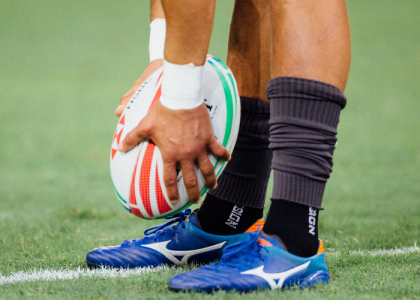Are you a sponge or a rock?

Rugby World Cup Winning Coach, Sir Clive Woodward, delivered a fascinating keynote presentation recently to attendees of the MHR Virtual Summit.
Held in late November, the three-day event was designed to help HR, payroll, learning and finance professionals prepare for the year ahead with a series of insightful presentations from in-house experts and industry leaders to customers and partners.
We knew we were in good hands with Sir Clive whose keynote session covered the theme of ‘Using data to create high performing teams’.
For many of the audience Sir Clive, is most remembered for leading England to World Cup victory in 2003. However, he revealed that his early career was spent in the finance world, namely at Xerox, before setting up his own small business.
Sir Clive talked about his experience in business and sport and likens the two areas in that you ‘deliver results through people’. He then went on to describe that ‘talent alone is not enough’, it is how you leverage that talent that is important. And it was at this point, Sir Clive introduced his sponges and rocks analogy.
Sponge vs rock
So, what is the difference between the two? If you are a sponge you have a thirst for knowledge, you have a passion about what you do and want to learn more.
A rock on the other hand is unteachable and in Sir Clive’s words ‘a bit of a know it all’. As a leader you want to make sure that your team has a sponge-like mentality and a growth mindset.
Using data and technology to win
In his early coaching days Sir Clive introduced technology to the team. At that time this was rare in sport, so they also embarked on a massive programme to upskill the whole team to be confident in using the technology. A decision which he was ridiculed for in the media at the time. However, his unusual tactics paid off. Allowing the team to take their skills to whole new level.
Sir Clive explained how by going on to say that ‘whoever wins in IT tends to win’. And demonstrated the point through a real-life example from a meeting he had with Arsène Wenger, the then coach of Arsenal Football Club. Arsène used software that monitored players every movement on the pitch during football matches. The software gave a fresh new perspective to watching a match. And Sir Clive was determined to bring this to rugby as he saw it a complete game changer to being able to measure and coach performance.
The software enabled Sir Clive and the team to completely understand every single player. They knew exactly where each player was and what they were doing from the data within the software. They also used the software to track their competitors and analyse their performance data which gave important insight and helped dispel myths about teams that they saw as being better than them.
But who used the data? The key was getting the players to analyse their own and their team’s performance, as well as that of the opposition. This enhanced the knowledge of every area of the game for each player and team dynamics went through the roof.
It’s not what you do but the way that you do it
The data made a massive difference. But the key is getting everyone within the organisation to use their experience to interpret the data across all levels.
When working with business leaders today, Sir Clive replicates an approach from his time in 2003 with the England team. He tasks them with writing a book about:
Exactly what you do in your job, or, exactly what your team does.
He then gets the leader to think about what would the chapters be within their book, before applying what he calls 3D learning:
- Discover – capture and share; create your chapters. Essentially this stage is all about being a sponge, continually learning – if you stop discovering you will turn into a rock.
- Distill – identify key points and create checklists. Once you have all the knowledge you need to distill it down into a simple checklist of the key points. This will make the boat go faster.
- Do – leverage key points, deliberate practice. Do the key points we have identified make us better than anyone else.
He summarises this approach as relentless learning.
And who is Sir Clive’s ultimate sponge? None other than Formula 1 supremo, Lewis Hamilton.


